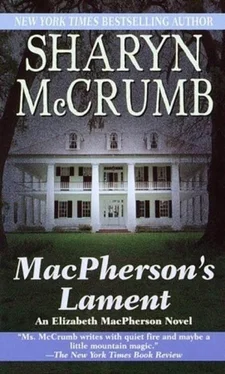Sharyn McCrumb - MacPherson's Lament
Здесь есть возможность читать онлайн «Sharyn McCrumb - MacPherson's Lament» весь текст электронной книги совершенно бесплатно (целиком полную версию без сокращений). В некоторых случаях можно слушать аудио, скачать через торрент в формате fb2 и присутствует краткое содержание. Жанр: Детектив, на английском языке. Описание произведения, (предисловие) а так же отзывы посетителей доступны на портале библиотеки ЛибКат.
- Название:MacPherson's Lament
- Автор:
- Жанр:
- Год:неизвестен
- ISBN:нет данных
- Рейтинг книги:3 / 5. Голосов: 1
-
Избранное:Добавить в избранное
- Отзывы:
-
Ваша оценка:
- 60
- 1
- 2
- 3
- 4
- 5
MacPherson's Lament: краткое содержание, описание и аннотация
Предлагаем к чтению аннотацию, описание, краткое содержание или предисловие (зависит от того, что написал сам автор книги «MacPherson's Lament»). Если вы не нашли необходимую информацию о книге — напишите в комментариях, мы постараемся отыскать её.
MacPherson's Lament — читать онлайн бесплатно полную книгу (весь текст) целиком
Ниже представлен текст книги, разбитый по страницам. Система сохранения места последней прочитанной страницы, позволяет с удобством читать онлайн бесплатно книгу «MacPherson's Lament», без необходимости каждый раз заново искать на чём Вы остановились. Поставьте закладку, и сможете в любой момент перейти на страницу, на которой закончили чтение.
Интервал:
Закладка:
Gabriel tried not to think about politics. Or losing the war. None of it made much sense to him, especially when you looked at the havoc that came of it all. But he thought that he might someday be old enough to tell the story of their retreat from Richmond for the comedy of errors that it was. He could laugh at it now if he hadn’t been living it. “So there we was,” he’d be telling his grand-younguns, “a-throwing pieces of that picket fence into the firebox on that locomotive and trying to get her a-going, and all the time we could hear them Yankees coming. Well, she finally built up a head of steam, and us sailors and a raft of the townsfolk clambered aboard, and off we chugged till we got to the first bit of a hill right outside the station near the riverbank, and she ground to a halt. That little locomotive wasn’t equal to the task of hauling that great bulk of humanity any great distance, and there we sat, with a right smart view of the city of Richmond. We could see lines of Union cavalry and artillery snaking along toward State House Square, and we reckoned any minute they’d look up and see us, and that would be the end of us. But if the Lord wasn’t on our side, then I reckon He sat that one out, ’cause they never paid us no mind, and besides, the bridges were all afire by then.
“By and by the steam engineer went running up to the admiral, and he must’ve told him about finding another locomotive hid away in the shops, because directly they went and hauled that engine out and hooked it on in front, and we were able to proceed at a crawl to the first decent woodpile. We lit out and grabbed the better fuel, and then we really fired up and got the hell out of Richmond.”
The farther they got from the scene of destruction, the easier they breathed, and even now he could find things to laugh about on the run to Danville. It seemed like they couldn’t go more than a mile without having to pick up a straggler-a stray colonel, even generals-left stranded by the recent turn of events. Then there were the railroad people. The admiral didn’t appear overly amused by the sight of those conductors and engineers bustling out from their stations and trying to take over the operation of the train now that the navy had assembled it and got it going. He soon sent them off with a flea in their ears!
They reached Danville around midnight on April 4 and slept in the cars until sunup. Later, when news of the fighting farther north filtered into Danville, they learned what a narrow escape it had been. After turning Lee’s flank at Five Forks, Sheridan’s cavalry had attacked the Southside Railroad. They had torn up the rail at Burksville Junction just an hour and a half after Admiral Semmes’s train had passed through there.
The orders to join General Lee in the field no longer stood. Admiral Semmes-now a brigadier general-organized the four hundred sailors left to his command into brigades. Hawks and Bridgeford were still serving under Captain Dunnington, who was now an army colonel.
“But we’re still bottom of the heap,” said Bridgeford. “Seems like the more it all changes, the more it stays the same for boys like us.”
They were in the trenches on the outskirts of Danville now, defending the new capital from raiding parties, and waiting to see if the Union Army would turn its might on this last stronghold. The green of spring and the budding trees made a welcome change from the devastation of the blackened city they’d left behind, but a steady drizzle made the landscape drab, chilling them as they huddled in their mudholes. Sunshine would have made their watch more pleasant, but it would have done little for the scenery: no place in Virginia was really beautiful that May. The fields were untended stubble, with weeds and broken fences; everywhere the neglect of the war years showed in Danville’s shabby appearance. Still, she was a luckier town than most of her sisters to the east.
“This is how I started out in this war,” Gabriel Hawks replied. “Stuck in a mudhole with a rifle, waiting to get shot at. Things sure do stay mostly the same, don’t they? You reckon they aim to pay us one of these days?”
Tom Bridgeford brushed the raindrops out of his face, making little rivulets in the streaks of dirt. “Hawks,” he said, with an exasperated sigh, “what in Tophet does it matter? What salary do you draw now that you’re an army private?”
“Eighteen dollars a month.”
Bridgeford nodded. “Eighteen dollars a month Confederate scrip. That is correct. And how much is a barrel of flour going for in Danville these days?”
“If one could be had? A thousand dollars, maybe.”
“And a turkey?”
Gabriel shrugged. “A hundred dollars easy. If they’d take your money.”
“They’d a dern sight rather have gold. And it’s more than fifty of our scrip dollars to buy a dollar in gold. So tell me, Hawks, what do you want your pay for? You tired of wiping your butt with corncobs, is that it?”
“I thought I might try to send some money home.”
“Hawks, your kinfolk in the hills may be better off than we are, as long as there are deer in the woods and fish in the creek. But it does you credit to worry over them. I no longer have that burden.”
Gabriel looked away. He knew that Bridge-ford’s parents and sister had passed away in Wilmington’s yellow-fever epidemic in the fall of ’62. Most likely that accounted for his bitterness about the state of the world. “I wish we could do something besides sit here,” he said.
Bridgeford gave him a weary smile. “You could go home. Johnson has. Willets left last night. Every day a few more men sneak away when the officers’ backs are turned. I don’t believe Captain Dunnington has cottoned on to how easy it is to jump ship when you’re in a ditch a hundred miles inland. How far is your farm from here? Fifty miles? Seventy? Why, you could-”
“Hold it! I saw something moving on the road!” Gabriel Hawks pointed to a shape just visible through the pines near the bend in the road. He shouldered his rifle. “Something’s coming at us.”
Bridgeford squinted into the distance. “It’s wagons, looks like. And saddle horses alongside.” He pushed Hawks’s rifle barrel away from its aim. “Put that down. They’re our people. I see a gray greatcoat in that first wagon. Don’t suppose it serves a man well in this rain, though. Better than nothing, maybe.”
Hawks shook his head. “I reckon they’re another swarm of fugitives separated from their lines. Poor Danville! They might rather be invaded by the Federals than these starving Rebs-at least they’d bring their own provisions.”
The somber procession tottered closer to the trenches. It was a sorry remnant of an army: walking skeletons shrunken inside their rags, wounded men barely able to stand and others on scarecrows of horses that looked as if they were walking their last mile. One soldier in oilskins clambered out of his trench and waved down the battered wagon. “Where ye from?” he hollered at them. “What news?”
The rain pelted down, making creeks of the wagon tracks in the muddy road. From the wagon the gaunt faces stared back at them, showing no emotion but weariness. Finally the driver of the wagon, a chalk-faced soldier in the tatters of a uniform, looked down at the questioner with an expression that could have been grief-or disgust. “Guess y’all ain’t heard,” he said. “We abandoned the lines near a week ago. Lee surrendered his troops today at Appomattox Courthouse. Somebody said the rest was here, so we come on.”
As the word spread from man to man, soldiers began to crawl out of the sodden trenches, congregating together on the road and questioning the ragged refugees, who seemed anxious to stagger on toward the town. “What must we do now?” they kept saying.
Читать дальшеИнтервал:
Закладка:
Похожие книги на «MacPherson's Lament»
Представляем Вашему вниманию похожие книги на «MacPherson's Lament» списком для выбора. Мы отобрали схожую по названию и смыслу литературу в надежде предоставить читателям больше вариантов отыскать новые, интересные, ещё непрочитанные произведения.
Обсуждение, отзывы о книге «MacPherson's Lament» и просто собственные мнения читателей. Оставьте ваши комментарии, напишите, что Вы думаете о произведении, его смысле или главных героях. Укажите что конкретно понравилось, а что нет, и почему Вы так считаете.












